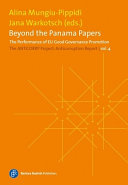Author
Schulze; Jeffrey M.
Year
2018
Publisher
University of North Carolina Press
Type
BOOK
Category
History
Language
English
Pages
272
ISBN
978-1-46963-710-5
Last Update
01-Nov-2024
Keywords
History
Related
See More
Considering the Creation of a Domestic Intelligence Agency in the United States

A Distinctive Voice in the Antipodes

Childhood Cultures in Transformation

Going Global?

Implications of Integrating Women into the Marine Corps Infantry

Beyond the Panama Papers. The Performance of EU Good Governance Promotion, The Anticorruption Report; volume 4